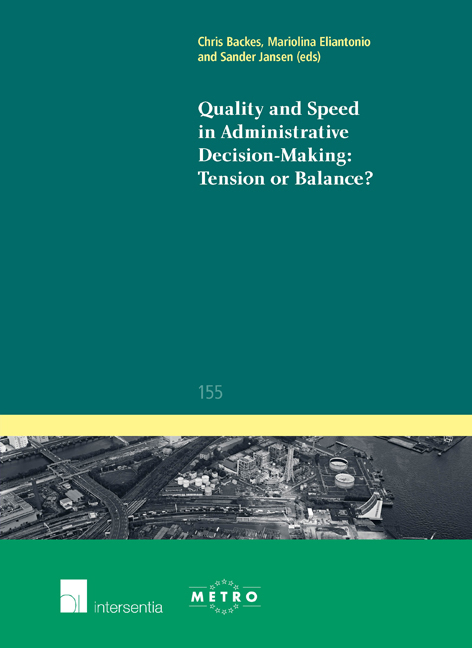Book contents
- Frontmatter
- Contents
- List of Authors
- List of Abbreviations
- Introduction
- Quality and Speed in Administrative Decision-Making: A German Case Study
- The Quest for Quality and Speed in Italian Administrative Law Or the Tale of some Elusive Targets
- Quality and Speed in Administrative Decision-Making: A French Case Study
- Planning for Major Infrastructure in England: Front-Loading Participation in the Interests of Efficiency
- Quality and speed in Judicial Procedures and Administrative Decision-Making: Environmental Permits in Sweden
- Faster and Better!? Decision-Making in the Netherlands
- Conclusions
- Ius Commune Europaeum
Quality and Speed in Administrative Decision-Making: A French Case Study
Published online by Cambridge University Press: 12 December 2017
- Frontmatter
- Contents
- List of Authors
- List of Abbreviations
- Introduction
- Quality and Speed in Administrative Decision-Making: A German Case Study
- The Quest for Quality and Speed in Italian Administrative Law Or the Tale of some Elusive Targets
- Quality and Speed in Administrative Decision-Making: A French Case Study
- Planning for Major Infrastructure in England: Front-Loading Participation in the Interests of Efficiency
- Quality and speed in Judicial Procedures and Administrative Decision-Making: Environmental Permits in Sweden
- Faster and Better!? Decision-Making in the Netherlands
- Conclusions
- Ius Commune Europaeum
Summary
‘A very extensive machinery was requisite before the government could know everything and manage everything at Paris. The amount of documents filed was enormous, and the slowness with which public business was transacted such that I have been unable to discover any case in which a village obtained permission to raise its church steeple or repair its presbytery in less than a year. Generally speaking, two or three years elapsed before such petitions were granted’.
This excerpt from French historian de Tocqueville reflects that administrative processes are naturally slow. How fast time passes is subjective, especially for those who rely on the administration's proper functioning. It is certainly not easy to determine what exactly constitutes an efficient and diligent administration from a theoretical perspective. Legitimate expectations of the citizens who are subject to an administrative act should obviously be taken into consideration but so should the essential requirements of the administrative action: one must not forget that it is in everybody's interest that the governance of a country runs well.
It is immediately apparent, as Cluzel has shown, that there is an inherent and ambiguous relationship between the need for quality in administrative decision making and speed in the procedure. Speed is obviously an actual component in the quality of a decision (in terms of receiving a quick decision), but it may also have the opposite effect. While speed can be measured, the quality of an act cannot as it is highly subjective or at the very least rather ambiguous. The term may be used as a superlative – and so we may speak in terms of a ‘quality’ procedure, which implies ‘high quality’, just as we may describe a product. It is also possible to speak of ‘the qualities’ of the procedure, meaning its characteristics. These two aspects are interrelated: if the procedure is of (good) quality, it is because it has certain qualities (characteristics). Furthermore, through requirements such as the right of defence and consultation procedures, it is possible to note guarantees of the good quality of the act itself.
- Type
- Chapter
- Information
- Publisher: IntersentiaPrint publication year: 2016

